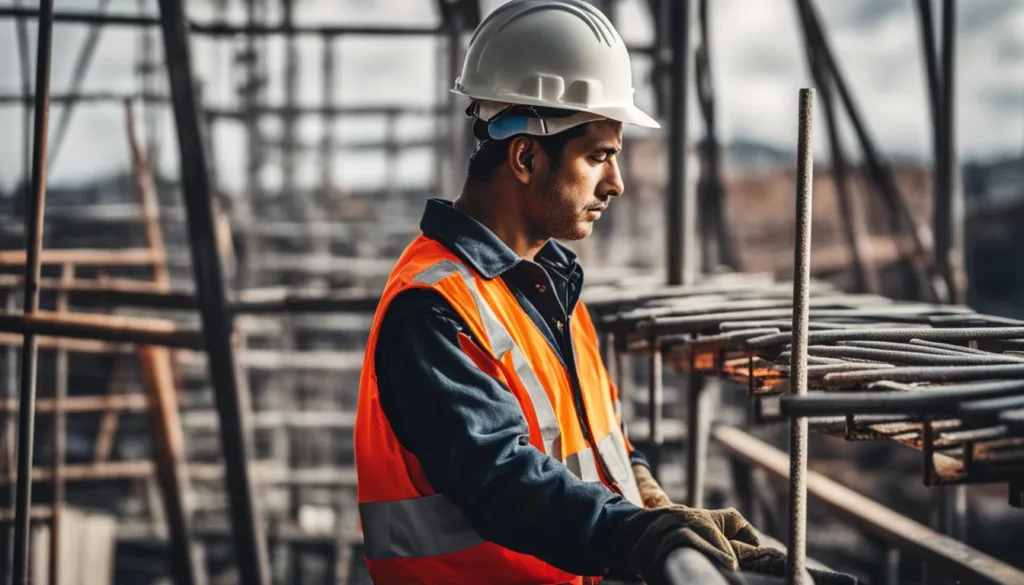Stress-Relief Techniques for Construction Workers in a High-Pressure Environment
The construction industry is known for its high-pressure and fast-paced environment, which can cause stress, burnout, and self-harming behaviors for workers. Tight deadlines, budget restrictions, physical demands, and unsafe work conditions all contribute to the stress experienced by construction workers. This stress can lead to decreased productivity, project delays, and even worker injury or death. It’s crucial for industry leaders to prioritize stress management and the well-being of their employees. Implementing stress relief techniques, such as workplace meditation, can enhance focus, improve mental health, and create a more supportive work environment for construction workers.
Key Takeaways:
- Meditation can be an effective stress relief technique for construction workers.
- Implementing stress management methods is crucial for the well-being of construction workers.
- A supportive work environment contributes to the mental health of construction professionals.
- Workplace meditation can enhance focus and improve overall well-being.
- Prioritizing stress management techniques can lead to increased productivity and improved project outcomes.
Factors Contributing to Workplace Stress in the Construction Industry
Managing stress in construction work is essential for improving mental health and building mindfulness practices in the industry. Construction workers face various factors that contribute to workplace stress, impacting their overall well-being.
Tight deadlines are a common stressor in the construction industry. The pressure to complete projects within limited time frames can create immense stress for workers. Additionally, budgetary restrictions and financial insecurity add to the stress levels, as workers may feel the need to compromise the quality of their work in order to save costs.
The physical demands of the job also contribute to the stress experienced by construction workers. Working in unfavorable weather conditions and the constant need for vigilance to avoid accidents further add to the stress levels. These factors make it challenging for construction workers to manage their stress and prioritize their mental health.
“Tight deadlines, budgetary restrictions, and compromising quality of work to save costs all create immense pressure on construction workers.”
Improving mental health in construction work involves addressing these stress-contributing factors and implementing strategies to manage them effectively. By recognizing the challenges, construction companies can create a healthier work environment that promotes the well-being of their employees.
| Factors Contributing to Workplace Stress | Impact on Construction Workers |
|---|---|
| Tight deadlines | Increased pressure and stress to meet project timelines |
| Budgetary restrictions | Financial insecurity and compromising quality of work |
| Physical demands of the job | Increased risk of fatigue, injuries, and accidents |
| Working in unfavorable weather conditions | Added physical and mental stress |
| Constant need for vigilance | Mental strain and heightened anxiety levels |
Addressing workplace stress is crucial for the well-being of construction workers. It requires a holistic approach that includes implementing stress management techniques, improving working conditions, promoting open communication, and providing resources for mental health support. By actively managing stress and improving mental health, construction companies can build a more positive work environment and foster the overall well-being of their workers.
Signs of Stress in Construction Workers
As a leader in the construction industry, it’s crucial for you to be aware of the signs of stress in your workers. Recognizing these indicators allows you to take proactive measures to address stress, prevent burnout, and create a healthier work environment for your team. Here are some common signs of stress-related behavior in construction workers:
- Decreased productivity: When construction workers are under high levels of stress, their productivity may decline. Keep an eye out for a decrease in output or a noticeable change in their ability to meet project deadlines.
- Changes in behavior: Stress can manifest in various behavioral changes. If you notice significant shifts in mood, attitude, or work habits, it may be an indication that your workers are experiencing high levels of stress.
- Increased irritability: Stress can make individuals more irritable and short-tempered. If your construction workers are showing signs of heightened irritability or outbursts of anger, it could be a result of stress.
- Withdrawal from team activities: When workers are stressed, they may isolate themselves from their colleagues and withdraw from team activities. They may prefer to work alone more often or avoid social interactions during breaks or team building exercises.
- Recurring accidents on construction sites: High stress levels can affect concentration and focus, leading to an increase in accidents on construction sites. If you notice a higher number of accidents or near-misses, it could be an indication of stress among your workers.
- Financial or job insecurity: Construction workers may experience stress due to financial concerns or job insecurity. Pay attention to any signs of anxiety or worry related to their financial stability or concerns about job stability.
By recognizing these indicators of stress in your construction workers, you can intervene early and implement strategies to support their mental well-being. Addressing stress not only improves their overall health and job satisfaction but also contributes to a more productive and harmonious work environment.

Quote
“Stress-related behavior in construction workers can have serious consequences for both the individual and the project as a whole. By being attentive to the signs and indicators of stress, leaders can create a safer and more supportive work environment.”
Strategies for Managing Stress in the Construction Industry
As a construction company, implementing effective stress management techniques is crucial for supporting the well-being and productivity of your workers. By prioritizing stress relief strategies and creating a supportive work environment, you can help your employees thrive in the demanding construction industry.
To manage stress effectively, consider the following strategies:
- Prioritize stress management from the executive level down: By demonstrating your commitment to stress relief, you set a positive example for your employees. Encourage leaders within your organization to prioritize their own well-being and promote stress management techniques.
- Offer employee assistance programs: Employee assistance programs (EAPs) provide professional counseling services and support for employees facing personal or work-related challenges. These programs can help construction professionals navigate stress and improve their mental health.
- Encourage open communication: Establishing a culture of open communication allows employees to voice their concerns, share their challenges, and seek support. Regularly check in with your team to ensure they have the resources and support they need to manage their stress effectively.
- Provide resources such as counseling and coaching services: Offering access to mental health resources such as counseling and coaching services can be highly beneficial for construction workers. These resources can equip employees with the tools and strategies they need to cope with stress and build resilience.
- Create a supportive work environment: Foster a culture that promotes teamwork, collaboration, and empathy. Encourage supervisors and team members to support one another and provide assistance when needed.
- Promote work-life balance: Striking a healthy balance between work and personal life is essential for managing stress. Encourage your employees to take breaks, use their vacation time, and prioritize their well-being outside of work hours.
“Prioritizing stress management techniques from the executive level down and creating a supportive work environment can significantly improve the overall well-being of construction professionals.” – [Quote]
Implementing these stress management strategies can contribute to a more positive and productive work environment in the construction industry. By investing in the well-being of your employees, you demonstrate your commitment to their success and improve overall job satisfaction.
| Benefits of Stress Management Strategies | Actions to Implement |
|---|---|
| 1. Increased employee satisfaction and morale | 1. Prioritize stress management techniques at the executive level |
| 2. Improved productivity and performance | 2. Offer employee assistance programs |
| 3. Reduced risk of burnout and mental health issues | 3. Encourage open communication |
| 4. Enhanced teamwork and collaboration | 4. Provide resources such as counseling and coaching services |
| 5. Decreased absenteeism and turnover rates | 5. Foster a supportive work environment |
| 6. Improved work-life balance | 6. Promote work-life balance |
Enhancing Emotional Intelligence and Mental Resilience in Construction Workers
Emotional intelligence is a key factor in promoting mental resilience within the construction industry. When construction workers possess high emotional intelligence, they are better equipped to make decisions under pressure, communicate effectively, and manage stress. This ability to understand and regulate their own emotions, as well as empathize with others, can significantly contribute to their overall well-being and job performance.
Construction companies can support the development of emotional intelligence in their workers through various strategies. Emotional intelligence training programs can provide valuable insights and tools for workers to enhance their self-awareness, emotional regulation, and social skills. By incorporating mindfulness practices into the work environment, such as meditation and deep breathing exercises, construction workers can improve their ability to stay centered and focused amidst the demands of the job.

When construction workers have a high level of emotional intelligence, they can navigate the high-pressure environment of the construction industry with greater ease. They possess the ability to recognize and manage their own emotions, effectively communicate with their colleagues, and adapt to stressful situations. This not only helps them cope with the challenges they face but also fosters a positive work environment where collaboration and teamwork thrive.
Furthermore, stress management techniques contribute to the development of emotional intelligence and mental resilience. By implementing strategies such as time management, prioritization, and self-care practices, construction workers can better regulate their stress levels and maintain their overall well-being. Engaging in regular physical exercise and maintaining a healthy diet and sleep routine also play a significant role in building mental resilience.
Benefits of Emotional Intelligence and Mental Resilience in Construction
- Improved decision-making under pressure
- Enhanced communication and conflict resolution skills
- Effective stress management
- Decreased risk of burnout and mental health issues
- Increased job satisfaction and productivity
By prioritizing the enhancement of emotional intelligence and mental resilience in construction workers, companies can create a more harmonious and supportive work environment. This, in turn, leads to improved job performance, lower employee turnover rates, and a stronger sense of camaraderie among the workforce.
Breaking the Stigma: Promoting Mental Health Awareness in the Construction Sector
Mental health issues are prevalent in the construction industry, but there is still a stigma surrounding these issues. It is crucial to promote mental health awareness and ensure that construction workers have access to the support they need. By increasing awareness, reducing stigma, and implementing practical solutions, we can create a workplace culture that prioritizes mental health in the construction industry.
One key way to promote mental health awareness is through education and training. By providing workshops and training programs on mental health and stress management, construction workers can gain a better understanding of how to protect their mental well-being. These programs can also help reduce the stigma by fostering open and informed conversations about mental health.
Employee assistance programs play a vital role in supporting mental health in the construction sector. These programs provide confidential counseling and support services to employees who may be struggling with mental health issues. By offering these resources, construction companies demonstrate their commitment to the well-being of their workers and provide them with the tools they need to manage their mental health effectively.
Regular mental health check-ins are another valuable strategy for promoting mental health awareness. By encouraging supervisors to have one-on-one conversations with their team members about their well-being, construction companies can create a space where employees feel comfortable discussing any concerns or challenges they may be facing. This practice promotes openness, empathy, and support, breaking down the barriers that contribute to the stigma surrounding mental health.
Creating peer support networks within the construction industry is also essential for promoting mental health. These networks enable workers to connect with and support one another, fostering a sense of community and solidarity. It provides an avenue for sharing experiences, coping strategies, and resources, helping to improve mental health and well-being across the sector.
By breaking the stigma and promoting mental health awareness, we can create a positive and supportive workplace culture in the construction industry. Prioritizing mental health is not just beneficial for individual workers’ well-being, but also for the overall productivity and success of construction projects. Together, let’s remove the barriers to mental health support and create an industry that values and supports the mental well-being of its workers.
The Pressures and Challenges in Construction Work
Construction work is filled with pressures and challenges that can significantly impact mental health. The tight schedules, complex regulations, client demands, public scrutiny, and long hours create an intense atmosphere in the construction industry. These stress factors in construction work can lead to stress, anxiety, and burnout among construction workers, affecting their well-being and job performance.
Recognizing and addressing these challenges is essential for creating a healthier work environment and supporting the mental well-being of construction workers. By implementing strategies to manage stress, providing resources for mental health support, and promoting work-life balance, construction companies can help mitigate the negative effects of these pressures and create a more sustainable and fulfilling work experience for their employees.
“The construction industry presents unique challenges, including demanding deadlines, high stakes, and physically demanding work. It’s important for employers to prioritize the well-being of their construction workers and create a supportive work environment that addresses the stress factors inherent in the industry.”
Top Challenges in the Construction Industry:
- Tight schedules
- Complex regulatory requirements
- Client demands and expectations
- Public scrutiny and accountability
- Long work hours and physical demands
Common Stress Factors in Construction Work:
- High-pressure deadlines
- Financial constraints and budget limitations
- Uncertainty regarding job security
- Physical strain and risk of injury
- Weather-related challenges
By addressing these challenges head-on and implementing strategies to manage stress, the construction industry can foster a more supportive and sustainable work environment for its workforce.
| Challenge | Impact |
|---|---|
| Tight schedules | Increased pressure and risk of burnout |
| Complex regulatory requirements | Compliance challenges and added stress |
| Client demands and expectations | High-stakes projects and need to deliver on time |
| Public scrutiny and accountability | Added stress and need for transparency |
| Long work hours and physical demands | Fatigue, strain, and increased risk of accidents |
Building Resilience in Construction Workers
Building resilience in construction workers is crucial for their well-being and job performance. The demanding nature of the construction industry can take a toll on mental health, making it essential to prioritize resilience-building strategies. By implementing effective techniques and promoting a supportive work environment, construction professionals can better navigate challenges and maintain their overall mental health.
Promoting Work-Life Balance
One important strategy for building resilience is promoting work-life balance. Encouraging construction workers to maintain a healthy separation between work and personal life helps prevent burnout and fosters overall well-being. By prioritizing time for rest, relaxation, and personal activities, workers can recharge and face challenges with renewed energy and focus.
Implementing Coping Mechanisms
Implementing coping mechanisms for stress management is another vital aspect of building resilience in construction professionals. Providing resources and support systems such as counseling services, stress management workshops, and peer support networks can help workers develop effective strategies to cope with the pressures of their job. These coping mechanisms equip workers with the tools they need to navigate stressful situations and bounce back from challenges.
Mindfulness Practices for Mental Resilience
Mindfulness practices play a significant role in building mental resilience in construction professionals. Incorporating techniques such as meditation, deep breathing exercises, and mindfulness-based stress reduction programs can help individuals cultivate self-awareness, reduce stress levels, and enhance mental well-being. Regular practice of mindfulness can improve focus, decision-making, and emotional regulation, enabling workers to better handle the demands of their work.
Prioritizing Physical Health
The physical health of construction workers is closely linked to their mental resilience. Regular exercise, a balanced diet, and sufficient rest contribute to overall well-being, enabling workers to better cope with work-related stressors. Employers can support physical health by providing access to fitness facilities, promoting healthy eating habits, and encouraging adequate breaks and rest periods between projects.
By prioritizing resilience-building strategies in the construction industry, companies can create a healthier and more productive work environment. Investing in the well-being of construction professionals not only benefits their mental health and job performance but also contributes to the overall success of construction projects.
Achievable Goals Foster Employee Well-being
Setting achievable goals in construction work is essential for fostering employee well-being. Unrealistic expectations can increase stress levels and lead to burnout. By creating open dialogues about workload expectations, promoting transparent communication, and rewarding the achievement of reasonable goals, construction companies can create a healthier work environment.
One effective strategy is to break down larger projects into smaller, more manageable tasks. This allows construction workers to track their progress and experience a sense of accomplishment as they complete each task.
Another approach is to provide clear guidelines and deadlines for each project. By clearly communicating expectations, construction workers can better plan their work and avoid feeling overwhelmed by vague or constantly changing requirements.
Furthermore, it’s important to involve the construction workers in the goal-setting process. By allowing them to contribute their insights and ideas, they will feel more engaged and motivated to achieve the goals they helped to establish.
Promoting work-life balance is equally important for the well-being of construction workers. Long hours and demanding schedules can take a toll on physical and mental health. Construction companies can support work-life balance by implementing flexible scheduling, providing opportunities for breaks and downtime, and encouraging employees to use their vacation time.
Lastly, construction companies should prioritize mental health initiatives. This can include offering employee assistance programs that provide access to counseling and mental health resources. Additionally, promoting a positive and supportive work culture where mental health is openly discussed and prioritized can help to reduce stress and create a healthier work environment.
By setting realistic goals, promoting work-life balance, and prioritizing mental health initiatives, construction companies can foster employee well-being and create a positive work environment that supports the overall health and happiness of their workforce.
| Benefits of Setting Achievable Goals | Importance of Work-Life Balance | Promoting Mental Health Initiatives |
|---|---|---|
| 1. Reduces stress levels | 1. Prevents burnout | 1. Access to counseling and mental health resources |
| 2. Boosts motivation and productivity | 2. Enhances overall well-being | 2. Positive and supportive work culture |
| 3. Creates a sense of achievement | 3. Improves work-life integration | 3. Open and transparent communication about mental health |
Conclusion
Prioritizing stress management and mental health in the construction industry is crucial for the well-being of construction workers and the success of projects. The high-pressure and fast-paced nature of the construction environment can lead to stress, burnout, and self-harming behaviors if not addressed effectively. By implementing stress relief techniques such as workplace meditation, companies can enhance focus, improve mental health, and create a more supportive work environment.
In addition to stress relief techniques, promoting mental health awareness is essential for breaking the stigma surrounding mental health issues in the construction sector. By increasing awareness, reducing stigma, and providing practical solutions such as education and training, employee assistance programs, and regular mental health check-ins, construction companies can create a workplace culture that prioritizes mental well-being.
Building resilience in construction workers is also crucial for their overall well-being and job performance. Strategies such as taking adequate rest between projects, implementing coping mechanisms for stress management, promoting work-life balance, and encouraging mindfulness practices can help construction workers navigate the challenges of their work and maintain their mental resilience.
In conclusion, by prioritizing stress management, promoting mental health awareness, and building resilience, construction companies can create a supportive and healthy work environment that enhances the well-being of their employees. Taking proactive measures to manage stress and promote overall wellness is not only beneficial for construction workers but also contributes to the success of projects in the industry.
FAQ
What are some stress relief techniques for construction workers?
Stress relief techniques for construction workers include workplace meditation, mindfulness exercises, deep breathing exercises, physical activity breaks, and connecting with nature during breaks.
How can construction companies manage stress in their workers?
Construction companies can manage stress in their workers by prioritizing stress management from the executive level down, offering employee assistance programs, encouraging open communication, providing counseling and coaching services, and fostering a supportive work environment.
What are the signs of stress in construction workers?
Signs of stress in construction workers include decreased productivity, changes in behavior, increased irritability, withdrawal from team activities, working alone frequently, recurring accidents on construction sites, and financial or job insecurity.
How can construction workers enhance their emotional intelligence and mental resilience?
Construction workers can enhance their emotional intelligence and mental resilience through emotional intelligence training, mindfulness practices, stress management techniques, and developing coping mechanisms for stress.
How can the construction industry break the stigma surrounding mental health?
The construction industry can break the stigma surrounding mental health by promoting mental health awareness, implementing education and training programs, offering employee assistance programs, conducting regular mental health check-ins, and creating peer support networks.
What are the major pressures and challenges in construction work?
The major pressures and challenges in construction work include tight schedules, complex regulations, client demands, public scrutiny, long hours, physical demands, adverse weather conditions, and the need for constant vigilance to avoid accidents.
How can construction workers build resilience?
Construction workers can build resilience by getting adequate rest between projects, developing coping mechanisms for stress management, promoting work-life balance, practicing mindfulness and relaxation techniques, engaging in regular exercise, and maintaining a balanced diet.
How can achievable goals foster employee well-being in construction work?
Achievable goals foster employee well-being in construction work by creating open dialogues about workload expectations, promoting transparent communication, setting realistic goals, rewarding goal achievement, prioritizing work-life balance, and implementing mental health initiatives.






